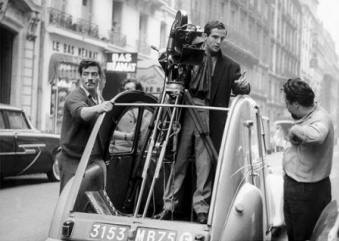The New Wave in France
 Postwar
French Cinema was largely concerned with style and form. Many
films combined fantasy, song, and social satire. The industry
was also heavily controlled by the studios.
Postwar
French Cinema was largely concerned with style and form. Many
films combined fantasy, song, and social satire. The industry
was also heavily controlled by the studios.
In 1951, Andre Bazin (1918-1958) founded Cahiers du Cinema. Bazin is best noted for auteur theory: the idea that films represent the personal vision of their directors (you will realize that Bazin's notions run through this class).
Cahiers critics were young and highly critical of French film which they found to be unspontaneous, literary, talky, too concerned with tastefulness and too polished. J-L Godard, a key Cahiers author wrote:
"What we were getting at is simply this: your camera movements are ugly because your subjects are bad, your casts act badly because your dialogue is worthless; in a word, you don't know how to create cinema because you no longer even know what it is."
Instead, they were inspired by the Italian neo-realists, particularly Roberto Rossellini. However, Rossellini urged them to stop writing about film and start making film. In 1959, they did. Some of the names of the Cahiers critics: Francois Truffaut, Jean-Luc Godard, Claude Chabrol, Eric Rohmer, and Jacques Rivette. All of (particularly the first two) became film makers associated with New Wave.
 Andre Bazin's name has come up numerous times in this course and he was certainly one of the most important figures in shaping the ways in which both filmmakers and critics understand movies. Bazin held two superficially opposed beliefs about film. First, that it was simply a mechanical way of capturing reality (he refers (I think mostly correctly) to people such as Muybridge, Edison, and Lumiere as 'ingenious industrialists.'). Second, that a film represents the vision and understanding of its director. The way these seemingly opposing beliefs were harmonized was by emphasizing film techniques that kept film close to the physicality of what was being depicted. Bazin loved techniques such as deep focus, wide shots, and long in-depth shots. He warned against the use of special effects, and montage. Bazin argued that it was these techniques that allowed the director's vision of reality to be faithfully portrayed and understood. Bazin died of leukemia at a very young age, just a day after Francois Truffaut, one of his closest followers began shooting The 400 Blows, the first of the French New Wave films.
Andre Bazin's name has come up numerous times in this course and he was certainly one of the most important figures in shaping the ways in which both filmmakers and critics understand movies. Bazin held two superficially opposed beliefs about film. First, that it was simply a mechanical way of capturing reality (he refers (I think mostly correctly) to people such as Muybridge, Edison, and Lumiere as 'ingenious industrialists.'). Second, that a film represents the vision and understanding of its director. The way these seemingly opposing beliefs were harmonized was by emphasizing film techniques that kept film close to the physicality of what was being depicted. Bazin loved techniques such as deep focus, wide shots, and long in-depth shots. He warned against the use of special effects, and montage. Bazin argued that it was these techniques that allowed the director's vision of reality to be faithfully portrayed and understood. Bazin died of leukemia at a very young age, just a day after Francois Truffaut, one of his closest followers began shooting The 400 Blows, the first of the French New Wave films.